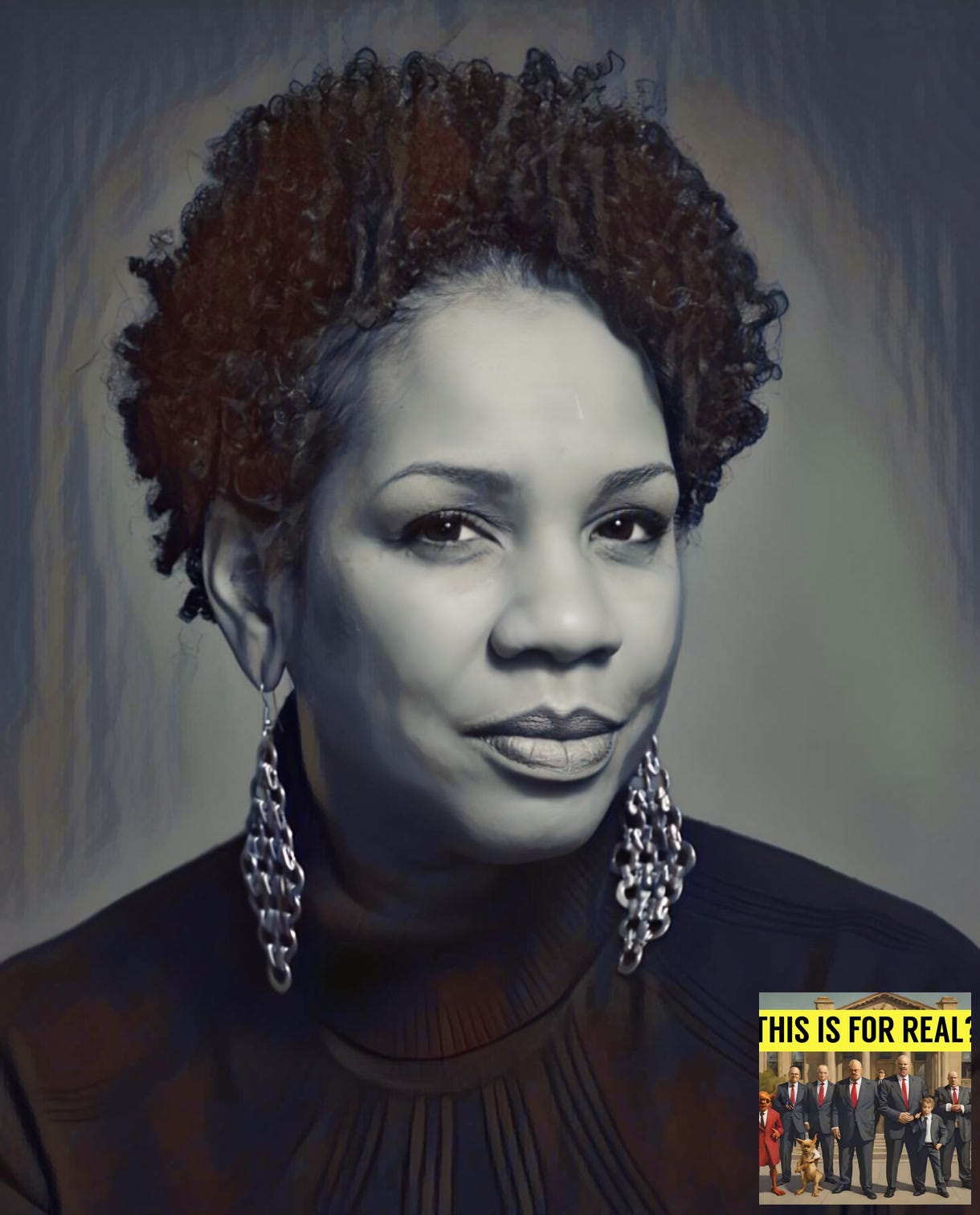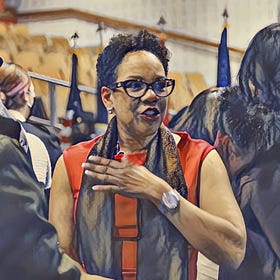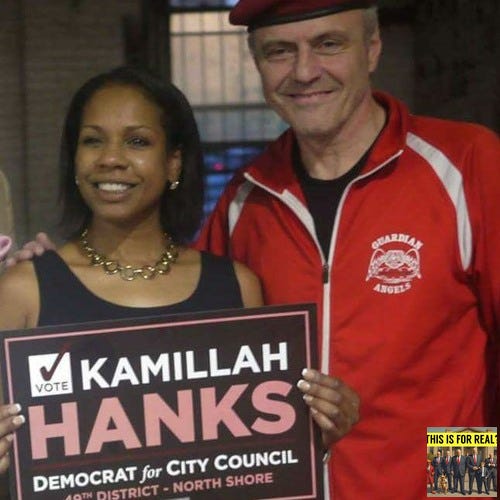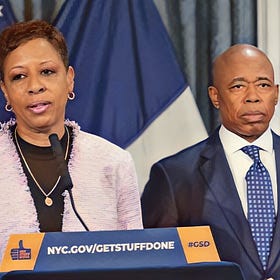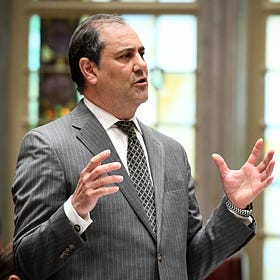NYC Council Committee 'Musical Chairs' Weaponizes Against Vernikov; Puts Hanks On Ice
Cumbo's Baby Daddy Sees Cultural Affairs Funds About to Evaporate; Republican "Uni-Party" Members See Their Strategy Backfire
By Modern Thomas Nast
NOTE: Don’t forget to vote in the Poll below.
I am a New York politico, and have been for a long time. The publisher knows who I am.
This past week, the NYC political landscape was still reverberating from ‘musical chairs’ on the Council’s Committee assignments. Now that the music has stopped, several players are without a seat. In the Council, that means Members Inna Vernikov (R-Brooklyn) and Kamillah Hanks (D-Staten Island) in the larger scheme, which means NYC Cultural Affairs Commissioner Laurie Cumbo and the NYPD.
Councilwoman Inna Vernikov Braces for Ethics Probe
Brooklyn Councilwoman Inna Vernikov, a Republican, is currently under the City Council's Standards and Ethics Committee microscope. This scrutiny follows an incident where Vernikov brought a gun to an anti-Israel rally at Brooklyn College.
Vernikov, who is Jewish with Ukrainian roots, is an attorney licensed to carry firearms. Despite dropping criminal charges due to the questionable functionality of the weapon, the Council's Ethics Committee is poised to launch its own investigation.
“This is political weaponization of a committee that is supposed to pursue justice,” Vernikov fumed.
The Committee has recently undergone significant changes, raising suspicions about the motives behind these adjustments. A notable shift is the replacement of Councilman Kalman Yeger (D-Brooklyn), a Vernikov ally, with Sandra Ung (D-Queens). Some see this alteration in the committee's lineup as a deliberate move to ensure Vernikov faces a probe, hinting at a possible targeted approach against her.
“Councilmember Yeger was removed from the ethics committee so that the Council can pursue a path of punishment against a Jewish Republican, even though no crime took place and all charges were dropped,” Vernikov said.
The Standards and Ethics Committee holds considerable authority in dealing with council members and is equipped with the power to impose sanctions ranging from fines and removal from committee posts to outright expulsion. The potential consequences Vernikov might face are severe, and they hinge primarily on the findings of the committee's inquiry.
Councilmember Kamillah Hanks Faces Intense Political Backlash
Councilmember Kamillah Hanks, representing Staten Island, is currently navigating a turbulent period in her political career, marked by a significant demotion from her position as chair of the Public Safety Committee. This move, widely interpreted as a form of retribution by Mayor Adams and Speaker Adams, has been described by former Councilman Sal Albanese as "absolutely punishment for disloyalty" to the city's top political figures.
NYC Council Member Kamillah Hanks Mired in Multiple Controversies
By Dick LaFontaine
NYC Council Member Kamillah Hanks finds herself at the center of multiple controversies, casting a shadow over her political career and raising serious questions about ethics and integrity in NYC governance.
At the heart of Hanks' political challenges is her support for the "How Many Stops Acts" bill, which aims to increase oversight on police street stops. Her backing of this bill put her directly at odds with Mayor Adams, creating a rift and leading to considerable political fallout. This stance, seen as a direct challenge to the Mayor's policies, has isolated her within the political landscape of New York City.
Council sources say that the mayor and the speaker wanted the "How Many Stops Acts" bill killed in committee to avoid the current political fallout of a mayoral veto and trigger law enforcement unions.
“Hanks is now toxic with the County Chair [Laura Sword], and no love was lost with Debi Rose supporters. Now, both Adamses are running from her. She’s basically relegated to the status of a back-bencher,” said a noted Staten Island Democratic County Committee Member and campaign strategist.
But You're Not Debi Rose
NYC Councilwoman Kamillah Hanks has a problem. She's not Debi Rose. And she'll never be her.
Hanks’ predecessor, Debi Rose, was always well-regarded in city politics, holding the post of Assistant Speaker of the NYC Council.
“She’s not going to be able to deliver the bacon. Before, she had control of a powerful committee. Now, she’s one vote on Land Use, Zoning, and a few other committees, and is the head of a sub-committee on ‘naming things.’ There’s not much juice there,” the source said.
Hanks is now chair of the Subcommittee on Landmarks, Public Sittings, and Dispositions.
“I want to thank the Speaker for the opportunity to chair the Subcommittee on Landmarks, Public Sitings, and Dispositions,” said Hanks speaking about her new position.
She continued, “Historic preservation and landmarking, now more than ever, has an important place in the development and land use in NYC. This is particularly true in boroughs like Staten Island where preserving and maintaining historic sites are extremely importance [sic] to the people in my district.”
Hanks also retains a vote on these committees: Civil Service and Labor, Cultural Affairs, Education, Environmental Protection and Finance.
Further complicating Hanks' situation is the withdrawal of support from the Police Benevolent Association (PBA), a crucial law enforcement union. The PBA revoked its endorsement following Hanks' vote in favor of the controversial bill, thereby deepening her political isolation.
Also adding to her woes are allegations surrounding her involvement with questionable cultural affairs grants. Reports have emerged that NYC Council funds were directed to a non-profit organization linked to Henry "Bobby Digi" Olisa, who is romantically involved with NYC Cultural Affairs Commissioner Laurie Cumbo. This connection has raised questions and increased scrutiny over the financial dealings between Hanks and Digi-Olisa's charity, the Canvas Institute for Arts and Culture.
Sources within the Comptroller's Office have indicated that these financial transactions are under close examination, and a formal investigation is possible. This probe could reveal more about the nature of Hanks' involvement and the appropriateness of the funds allocation.
Despite the mounting challenges and her recent demotion, Hanks remains steadfast in her commitment to her role as a council member. She continues to express her intention to represent her district, indicating her determination to weather the political storm and navigate the upheavals that have marked her tenure.
Cultural Affairs Commissioner Cumbo in Spotlight Amid Controversy and Potential Investigation

Cultural Affairs Commissioner Laurie Cumbo is currently at the center of a growing controversy involving her ties with Councilwoman Kamillah Hanks and Henry "Bobby Digi" Olisa. Allegations have surfaced about the potential misdirection of New York City Council funds to Digi-Olisa’s non-profit organization, the Canvas Institute for Arts and Culture. These accusations have raised significant concerns over using public funds and the interplay of personal relationships within the council's operations.
At the heart of this scrutiny is the role played by Hanks in allocating Council Cultural Affairs funds to the Canvas Institute. This decision has come under close examination, particularly given Digi-Olisa’s past legal issues and romantic involvement with Commissioner Cumbo. The nature of these relationships and their influence on allocating council resources have become points of contention and public interest.
Digi-Olisa's background, marked by legal troubles, claims of previous non-profit mismanagement, and alleged ties to organized crime, further complicates the matter. His role in the Canvas Institute, a beneficiary of council funds, has led to increased scrutiny and concerns over the organization’s funding. The intertwined relationships between Digi-Olisa, Cumbo, and Hanks have raised questions about the transparency and propriety of these financial dealings.
Anchoring Scandal While Adams Looks On: Cumbo, Hanks, and Digi-Olisa Crew NYC's 'Ship of Fools'
By M. Thomas Nast
In 2002, New York City faced controversy involving actor Danny Aiello and his associates in a failed plan to convert a neglected harborfront area into a movie studio. Now, a controversial grant of NYC Cultural Affairs funds is raising eyebrows.
Amid these allegations, sources inside the Comptroller's Office have suggested the possibility of a formal investigation into these financial transactions. Such an inquiry would dissect the nature of these transactions and the interconnected relationships among the involved parties, shedding light on the ethicality and legality of the fund allocations.
Digi-Olisa's highly publicized proposal to Cumbo at the Met Gala added a layer of public intrigue to this situation. This public display spotlighted their relationship and fueled further speculation about their combined influence on city affairs and decision-making processes.

The funding of the Canvas Institute, particularly in light of Cumbo’s official position and Digi-Olisa’s contentious past, has prompted calls for a thorough audit. There is a growing demand for clarity and accountability, ensuring these financial transactions are conducted appropriately and transparently.
PBA Outcry Over Yusef Salaam's Appointment as Public Safety Committee Chair
The appointment of Councilman Yusef Salaam as the new chair of the Public Safety Committee has been met with marked disapproval from the Police Benevolent Association (PBA). The Public Safety Committee, which plays a crucial role in overseeing the New York Police Department (NYPD), is now led by an individual whose past and views have caused significant unease within the union.
Salaam's history, notably his exoneration as a member of the "Central Park 5," coupled with his progressive stance on law enforcement, has fueled the PBA’s concerns.
“We’re worried he will focus more on relatively inconsequential things police are doing wrong and less on what they are doing right, catching criminals. It’s a recipe for disaster,” said a PBA source.
The union perceives Salaam’s appointment as a marked shift away from the interests of law enforcement, potentially impacting the operations and morale within the NYPD.
This discontent from the PBA is not new; it follows on the heels of their withdrawal of support for Councilwoman Kamillah Hanks. The union's decision to revoke its endorsement came in the wake of her support for the "How Many Stops Act," legislation viewed by the PBA as “strongly” anti-police.
From NYC Public Safety Chair to Political Outcast: Kamillah Hanks' Demotion
In a stunning political shift, New York City Council Member Kamillah Hanks faces a demotion from her role as chair of the Committee on Public Safety. Her endorsement from the PBA being dropped may have something to do with it.
A noted Democratic Political Consultant says the prospect for reconciliation between Hank and law enforcement unions is “limited.”
“Even if she flips back her vote to support Mayor Adams and the Council override of the [How Many Stops Act] fails, she’s lost the police unions. And once they leave, they never come back,” the source said.
With Salaam's appointment, the PBA sees a continuation and perhaps an intensification of policies that do not align with law enforcement’s best interests.
“I don’t see how [Salaam] won’t take his personal views into the committee room and allow them to cloud his judgment on what’s in the best interests of the safety and security of all New Yorkers,” the source said.
The PBA's apprehensions about Salaam's leadership come at a challenging time for the NYPD. The department is currently contending with a rise in specific crimes, such as auto thefts and assaults on officers. Additionally, the NYPD has been grappling with a significant number of officer resignations and retirements, an ongoing trend since 2020.
These departures have led to concerns about the department's ability to maintain its strength and effectiveness. In response, union officials have advocated for new legislation to retain younger officers, emphasizing the need to address the issues leading to this steady exodus. The NYPD and the PBA are actively seeking strategies to stem this tide of departures, ensuring the force remains robust and capable of handling the city's diverse and challenging law enforcement needs.
“You have a guy who sat in prison for ten years angry at certain individuals for an unwarranted conviction. Everyone feels for him, but that doesn’t mean that the entire NYPD should be unable to do their jobs. You handcuff criminals, not cops,” the PBA source said.
In this context, Salaam’s appointment adds another layer of complexity to the NYPD's ongoing struggles. His leadership of the Public Safety Committee will be closely watched by the PBA and the law enforcement community as they navigate these turbulent times and seek to balance the demands of policing with the mercurial political landscape of New York City.
"Uni-Party” SI GOP Faces Backlash and Potential Funding Crisis

Republican Minority Leader Joe Borelli and other prominent Staten Island GOP figures face criticism for their recent political strategies. Central to the controversy is their decision to support Councilwoman Kamillah Hanks, a Democrat, rather than putting forward a Republican candidate in last year’s elections. This move has sparked debate and led to significant discontent within the party's local base.
“As a ‘red enclave,’ the Republican electeds must have someone in the majority carry their ‘legislative water.’ This is true both at City Hall and in Albany,” said the aforementioned noted Staten Island Democratic County Committee Member and campaign strategist.
Lifelong Republican Guest Writer Modern Thomas Nast: Staten Island GOP Leadership Suffers from "Electile Dysfunction"
Frank Report has published an explosive article detailing corruption within Staten Island GOP Leadership, penned by lifelong Republican “Modern Thomas Nast,” a pseudonym.
Staten Island Republican Party Bosses Trade Judgeships for Democrat Favors.
Democrat back-benchers can’t carry Republican water. Local Staten Island leadership, including Borelli, County Chair and Assemblyman Michael Tannousis, and State Senate Deputy Minority Leader Andrew Lanza, are feeling a backlash from the rank-and-file party members.
An incident that brought these tensions to the forefront involved Borelli's public confrontation with a local media consultant at a recent party event. The consultant had worked for Hanks' opponent on an Independent line, Ruslan Shamal, a registered Republican who was denied the party’s line in favor of a blank ballot line.
“He went over and was hollering at him for going against Hanks, saying, ‘We support her,’ and ‘We need her,’ said a local political operative in attendance. “It’s getting very sad. These guys [the SI GOP leadership] believe everyone has to kiss the ring, even before they make a buck. But the last time I checked, Lanza and Tannousis didn’t have to ask permission to make legal fees.”

Highlighting the deep divisions within the party, this confrontation has only exacerbated the backlash against Borelli and the party leadership.
Staten Island business owners, traditionally supporters of the GOP, have voiced their frustration over these decisions. Their disappointment is palpable, with one owner openly criticizing the party for allowing Democrats to take winnable judgeships, council and assembly seats, and the DA’s Office.
BREAKING: McMahon asks Lanza to "Sit Down" on Staten Island District Attorney Seat
State Senator and Deputy Majority Leader is part of the SI GOP leadership that chooses not to contest Democrats in winnable elections.
“I wish [the SI GOP] would field our own candidates rather than supporting Democrats. This sentiment is echoed by many in the business community. I think they are letting us down with their recent choices,” said a local restaurateur and self-described member of the “party faithful.”
This growing disillusionment has had a tangible impact on the party's finances. A notable number of local Republican supporters are now reevaluating their financial contributions to the party.
“The Staten Island GOP leadership's strategy of backing Democrats in crucial elections has led to a sense of betrayal among the base. We’re not members of the ‘Uni-Party,’ but they are,” said a notable Staten Island right-wing political activist.
The consequences of these internal rifts and miscalculations are becoming increasingly evident in local GOP campaigns, resulting in a potential financial crisis for the party. Disappointed by the party's direction, some local business owners and supporters are withdrawing their financial support. One local business owner is particularly miffed.
“Why am I making financial contributions to ‘the local bullshit’ and seeing no results? I’d rather send the money to Trump or Lee Zeldin, somewhere I know it will be put to good use and not support the Democrat agenda,” the businessman said.
Staten Island Democrats play the same game with the Republicans and the Conservative Party line.
Amidst these challenges, there is a strong call from local Republicans for more robust representation in elections. The absence of GOP candidates in key positions has led to dissatisfaction and a sense of abandonment among the party's base. A redirection of funds and support may indicate a significant loss of confidence in the local party leadership.
The Staten Island GOP, under the leadership of Joe Borelli, Andrew Lanza, and Michael Tannousis, is confronting a multifaceted crisis. From internal disagreements to financial backlash and a call for better representation, the party is at a crossroads. What will happen when their music stops?







